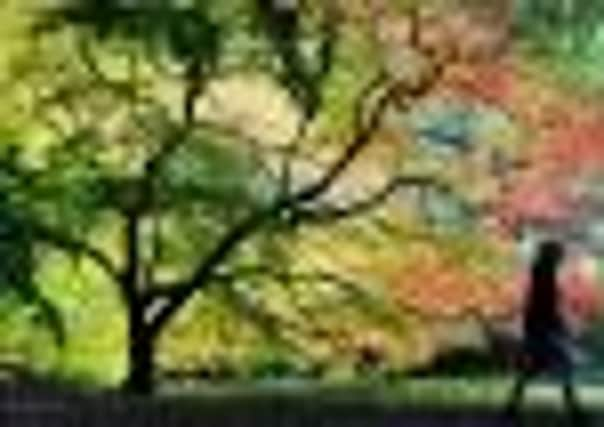Autumn colours highlight a lack of knowledge of nature


AT this time of year, as summer fades into autumn, our parks, forests and gardens are at their most spectacular.
For a few colourful weeks our trees become a riot of green, red, yellow and brown before they finally shed their leaves, heralding the start of winter. Nature’s annual magic show transforms our landscape but how much do we actually know about the trees that surround us?
Advertisement
Hide AdAdvertisement
Hide AdAccording to a new study, not a lot. Britain is believed to have the largest population of ancient trees in Europe and yet our nation’s tree knowledge leaves a lot to be desired.
The research, carried out by Bosch Lawn and Garden and supported by the Ramblers Association and Woodland’s Trust, shows that four-fifths of those questioned in Leeds, for instance, failed to recognise the leaves of an ash and over 75 per cent couldn’t recognise those of a beech tree.
On the plus side, the majority of people were able to identify an oak and nearly half (46 per cent) recognised a chestnut tree’s leaves.
But despite the fact that most of us like to think we’re environmentally aware and want to see more trees planted, our knowledge of native trees is poor. According to the study – part of British Tree Week which runs until Saturday – around 20 per cent of under-25s thought an acorn came from a willow and one in six believed there was such a thing as an acorn tree, while less than half of those questioned knew that a horse chestnut produces the conker.
Advertisement
Hide AdAdvertisement
Hide AdTree knowledge varies widely across the country with people in Norwich topping the British Tree Week league ahead of Leeds, Southampton and Sheffield, with Glasgow coming last.
Perhaps not surprisingly, the older generation are far more tree-savvy with around 75 per cent understanding the term “deciduous” compared with less than a quarter of those questioned aged under 25. Equally, close to 90 per cent of over-50s recognised that conkers come from a horse chestnut unlike those under 25 where less than half knew the correct answer.
Gary King, marketing manager at Bosch Lawn and Garden, says the aim of British Tree Week is to encourage people to get to know more about our native trees at a time when our pavements and pathways are under a blanket of multi-coloured leaves and seeds.
“We want to help shine a light on our native varieties and motivate people to learn how to care for and look after their own trees.”
Advertisement
Hide AdAdvertisement
Hide AdBut how concerned should we be by the study’s findings? “It’s startling that even though probably all of us have played conkers at some point – more than half of all those under-25 that we questioned didn’t know they come from the horse chestnut.
“Our research shows that a quarter of us can’t even name the trees in our own garden which is a real shame.”
Even so, we are a nation of tree lovers with most people supporting calls for more trees to be planted around the country. Earlier this year, when plans were unveiled to transfer ownership of many public forests in England it provoked a furious backlash with such diverse figures as Dame Judi Dench, poet laureate Carol Ann Duffy and the Archbishop of Canterbury leading a campaign against the move.
These days, with the vast majority of us living in towns and cities, going to a forest or woodland is a way of escaping our ring-roaded civilisation and getting back to nature.
Advertisement
Hide AdAdvertisement
Hide AdIt’s something the Ramblers – Britain’s walking charity – is keen to support as Tom Franklin, its chief executive explains. “There is nothing more magical than an autumn walk through the woods as the leaves start to change colour and the public outcry over the sale of English forests demonstrated just how much we use and value our local woodland.”
Chris Hickman, of the Woodland’s Trust, says trees play a more significant role than many of us realise. “People look around and think trees are everywhere, but the woodlands and forest cover in the UK is only 13 per cent compared to the European average of over 40 per cent. Which is why it’s important that we inspire and educate our young people so that they appreciate them and realise how important they are.”
So even if our knowledge of trees isn’t as good as it should be, most of us appreciate that our world would be bereft without them – and the sight of sunlight reflecting on a willow’s fading golden leaves, as well as being quintessentially English, is one that still warms the soul.